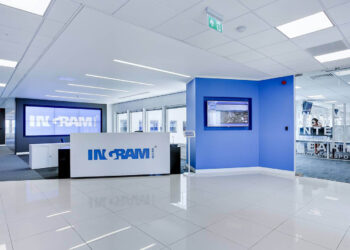Bytes Technology Group has just unveiled bumper first-half results showing a 14% and 16% hike in gross invoiced income (GII) and operating profits, respectively.
The LSE-listed giant also revealed its annualised Microsoft Copilot sales now stand at £39m.
Here IT Channel Oxygen rounds up five key talking points.
Public sector take a bow
CEO Sam Mudd hailed BTG’s first-half numbers as “another set of positive results”, as GII – its ultimate top line – pogoed 13.7% to £1.23bn.
Public sector played the starring role as its contribution rose from 67% to 70% of the total, year on year. While public sector GII bounced 19.5% to £862.8m, corporate GII advanced by a muted 2.1% to £367.4m.
Further growth of meaty NHS and HMRC contracts landed the previous year bolstered the top line (while also dampening gross profit as a % of GII from 7% to 6.7%), BTG said.
Customers that traded with BTG in the prior year period contributed 98% of its gross profit this time around, at a renewal rate of 107%, it added.
Hire purpose
BTG continued to hire during the period, with its headcount rising 6.9% half-on-half and 10.1% year on year to 1,130.
New offices were opened in Sunderland and Portsmouth, while the reseller also expanded its floorspace in London.
Over half of BTG’s employees participate in its ‘Share Save Plans’, the fourth of which it launched in August, it stressed.
Copilot clamour
Having rolled Copilot for M365 across all sales and marketing employees, BTG revealed it has now sold over 130,000 licenses of Microsoft’s new AI tool.
This has generated annualised GII of around £39m, it said.
“We will further expand our existing in-house AI-dedicated teams, creating repeatable sector specific solutions with broader data and GenAI services across our vendor offerings as this income stream continues to grow in the second half of FY25 and beyond,” Mudd stated.
Getting attentive on incentives

BTG claimed the overall incentive opportunity of one of its “key” vendors is “expected to grow” following a change to its incentive plan.
Microsoft is known to have informed its top-level LSP partners that it is cutting the margin they earn on Enterprise Agreements (but increasing incentives in other areas, such as CSP and Copilot).
Although Mudd said the changes made by its unnamed vendor partner – which are set to come in on 1 January 2025 – “might result in lower incentives in a few areas”, it added that “the overall incentive opportunity is expected to grow”.
“We have a long track record of successfully adapting to such changes and do not expect there to be a material impact in the current or next financial year,” she said.
BTG counts Palo Alto, HP, Nutanix, Checkpoint, Sophos, Cato Networks, Bitdefender, Adobe and Druva among its other key vendors.
Mudd in good mood
In her results statement, Mudd said:
“I am pleased to report another set of positive results for BTG, with a strong increase in operating profit, driven by continued demand for our broad range of software, solutions and services.
“Despite the challenging economic climate and political uncertainty over the past six months, we have increased our share of wallet amongst our existing customers as they continued to invest in their IT needs. We have also expanded our client base in both the public and corporate sectors.”













